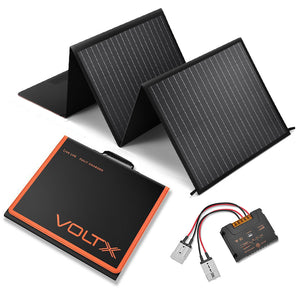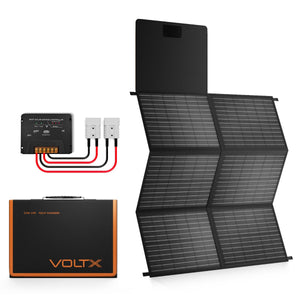A solar lithium battery charger is the best way to keep your lithium batteries charged when you 're away from any mains supplied power. These can be set up relatively quickly and provided you keep them away from your main campsite, they will not hinder your camping at all. Ideally, you should decide where your solar panels will go before you set up camp so you can place them in an area that can capture the most amount of sunlight.
When setting them up, keep them away from any tree coverage and choose the area that will get the most amount of direct light. After choosing a spot for your panels, set them up and check that you 're getting a good charge.
At Outbax, all our solar panel systems are chosen for their durability in the harsh Australian environment. Our products use monocrystalline cells since they are the hardiest and most efficient when it comes to providing you with free and clean power. For anyone who is travelling, having access to power can be difficult, but when you can generate your own, it becomes less of a problem. Solar power systems are suitable for many different situations. They are ideal for boating, camping, hiking, and even four wheel driving. They can keep all your vital equipment up and running, keep the lights on at night, and you might even have enough power to run a refrigerator to keep your food cold.
At the Outbax online store, we have many lithium batteries available, including the 100Ah, 200Ah and 300Ah. These can all be set up with the appropriate solar panels such as our solar blankets, or the foldable solar panels. If you need assistance in choosing the right one for you, please call one of our team members and they 'll be happy to help you out.
How does a solar lithium battery charger work?
A solar lithium battery charger works much in the same way that a regular battery charger does, except it converts light from the sun (which is composed of particles of energy called "photons") to create the electricity to recharge your battery. All you need to do is to ensure that the solar panels receive a good amount of direct sunlight and connect the cable to the right terminals. If you installed them correctly, your batteries should start charging immediately. For the best results with your panels, you should move them during the day so they are always facing the sun, since they charge better when they get direct sunlight. Most lithium batteries will automatically stop charging when they have reached full capacity, but it would be a good idea to check up on them every few hours. There are LiFePO4 batteries with a built-in LCD power voltage indicator.
Can I use a solar lithium battery charger for camping?
A solar lithium battery charger is perfect for most camping situations. Provided you have access to an area that receives a good amount of sunlight then it will charge up your lithium battery to an acceptable standard. The only real limitation of your solar panels is the number of watts they can provide you in an hour. All camping solar panels are rated to a certain wattage and this is relative to the amount of charge they can provide. With a 250W solar panel system, you can generate an average of 1750 watts per day, or about 145 amp hours (Ah).
You 'll find that a solar lithium battery charger is lightweight and can be taken on hiking trips and to other camping sites. If you are walking great distances, then you want a solar power kit that is durable and lightweight so most solar blankets are ideal for this situation. While you can use glass solar panels at a campsite, they can be heavy so they are more suitable if you 'll use them near your vehicle. It 's also possible to have fixed solar panels on your vehicle if you have the right place to mount them (usually roof racks are all you need). The power you can get from a solar lithium battery charger is often enough to power most campsites. Since solar power systems are modular in nature, you can always add extra batteries and panels to make sure you 're covered for all your power needs.
When you get any new camping equipment, it is a great idea to have it all set up and running in a situation where you have access to a reliable backup power supply; this could be a portable generator or grid power. Ideally, you should have everything running smoothly and at the end of the day, check the batteries to their power levels so you can decide if you need to get more additional solar panels to generate more power. If you run out of power at night time, you may need to invest in another battery. If you need assistance in setting up your gear, you can call our team members during business hours and we can discuss your options or we could help you identify any additional items you need to get the most out of your solar lithium battery charger.
Frequently Asked Questions
- How does a solar lithium battery charger work?
- Can I use a solar lithium battery charger for camping?



